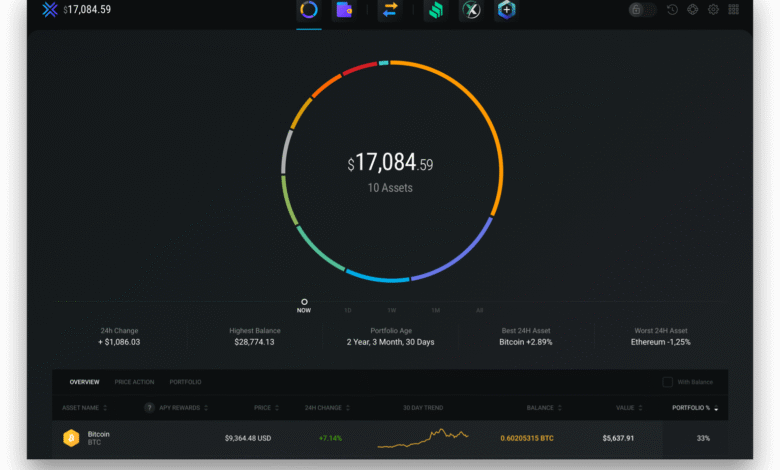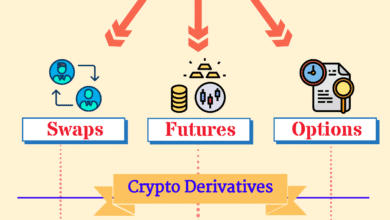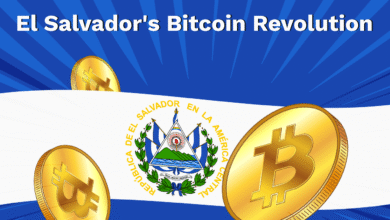Exodus Crypto Wallet Ends Support for Monero (XMR) Soon

The Exodus crypto wallet is a popular choice for cryptocurrency enthusiasts, but it has some significant updates coming in the near future. Notably, Exodus recently announced it will end support for Monero (XMR) on August 10, 2025, which is important news for users who rely on this privacy coin. After this cut-off date, users will be unable to send, receive, or monitor their Monero balances directly through the Exodus wallet, raising concerns among the community. Thankfully, the Exodus wallet maintains a strong emphasis on user control, allowing customers to hold and manage their funds via compatible wallets. As we look at this evolving landscape, staying informed with the latest Exodus wallet news regarding crypto wallet updates will be essential for those invested in Monero support and other digital currencies.
The Exodus cryptocurrency wallet has emerged as a favored platform for managing various digital assets, yet it is facing a pivotal change that users should be aware of. With the announcement of Monero (XMR) support ending in 2025, those utilizing this wallet for their privacy-focused investments will need to adjust. Customers seeking a reliable self-custody solution are encouraged to explore compatible wallets to retain access to their Monero holdings. Furthermore, as the crypto wallet landscape evolves, it remains crucial to keep up with the latest updates and recommendations regarding digital asset management. By staying informed about changes within the Exodus platform, users can successfully navigate the future of cryptocurrencies like Monero.
Exodus Crypto Wallet’s Decision to End Monero Support
In a significant move for users of the Exodus wallet, the company announced that it will stop supporting Monero (XMR) starting on August 10, 2025. This announcement has left many users concerned about the future of their holdings in the privacy-focused cryptocurrency. As Exodus is known for its user-friendly interface and extensive range of supported assets, this decision signals a turning point for Monero enthusiasts who relied on Exodus for managing their XMR. The transition may be challenging for some users, but Exodus has emphasized the importance of user control and self-custody of funds, ensuring that even after support is discontinued, users can access their funds through compatible wallets.
The ability to send, receive, or view Monero balances within the Exodus wallet will cease on the designated cut-off date. However, potential users of the Exodus crypto wallet can take comfort knowing that they have options available to them. The company has urged its users to act proactively by either migrating their Monero holdings to other platforms or converting them into alternative assets before the deadline expires. This proactive migration is vital for maintaining the integrity and usability of one’s crypto portfolio.
As the date approaches, it becomes essential for holders of Monero (XMR) to explore their options for managing this transition. Users have the opportunity to swap their XMR for other cryptocurrencies within the Exodus wallet before the final cut-off. This flexibility helps mitigate potential losses and allows for a better diversification strategy moving forward. Keeping an eye on Exodus wallet news and updates will provide essential insights into new features or options available to users until the deadline.
Moreover, Exodus has committed to providing extensive guidance on how to manage this transition effectively. From detailed FAQs to direct support for transferring assets, users of the crypto wallet can feel reassured that their questions will be addressed. Monero support in Exodus may be coming to an end, but the company’s dedication to its users does not waver, making it crucial to stay informed during this transition phase.
Alternatives to Exodus for Managing Monero Holdings
In light of Exodus’s upcoming cessation of support for Monero (XMR), users are encouraged to explore alternative wallets that are tailored for privacy coins. Several options on the market are specifically designed to cater to the unique needs of Monero enthusiasts. These crypto wallets not only allow for ease of managing XMR but also emphasize security and privacy features that appeal to users who prioritize anonymity in their transactions. By researching and selecting the right crypto wallet, users can ensure that their Monero holdings remain secure and easily accessible after support ends on Exodus.
It’s important to assess wallets that are known for their Monero support, such as the official Monero wallet or other third-party wallets that prioritize privacy and decentralization. These alternatives can provide robust features for sending and receiving Monero, aligning with users’ needs for confidentiality and security as they move away from Exodus. Furthermore, many of these platforms offer helpful exchange features, enabling users to swap assets seamlessly without compromising their privacy.
When transitioning away from Exodus, it’s vital for users to consider not only the functionality of the wallet but also the level of community support it provides. Many crypto wallets focused on Monero come with dedicated forums and resources that can assist users in learning the ins and outs of managing their privacy coins effectively. By choosing a wallet with an engaged community, users can stay updated on any crypto wallet updates and changes in the Monero ecosystem, which can further aid in the understanding of market trends and transaction best practices. Educating oneself on privacy coins and their unique features will undoubtedly contribute to a smoother transition and stronger asset management.
Understanding the Implications of Ending Monero Support
The decision by Exodus to end support for Monero (XMR) by August 10, 2025, carries significant implications for the broader cryptocurrency community, particularly for those who value privacy. Monero is renowned for its sophisticated privacy features that allow users to conduct transactions without revealing their identities. Therefore, Exodus’s withdrawal may cause concerns about the future accessibility of such privacy-focused features in other wallets, urging users to adapt their strategies. Users must now evaluate how this change aligns with their overall investment strategies, potentially leading to a rethinking of the tools and wallets they choose to use.
Additionally, as the cryptocurrency landscape continues to evolve, the impact of such significant changes should not be underestimated. For those invested in Monero, understanding its role within the ecosystem becomes crucial. It pressures users to remain vigilant and informed about market dynamics and the evolving privacy regulations surrounding cryptocurrencies globally. The departure from Exodus opens up a dialogue around the importance of self-custody and suggests a need for more education surrounding privacy coin management.
As the August 2025 deadline approaches, users should consider not only the alternatives available but also the importance of proactive asset management. Exodus has indicated it will offer help during this transition, and users should harness these resources – including guides for migrating their Monero holdings. These proactive measures are vital as users navigate the impact of losing Monero support within Exodus. Ultimately, staying informed about the latest developments in the cryptocurrency industry, particularly regarding Monero and Exodus wallet news, will empower users to make well-informed decisions moving forward.
Migrating Monero Holdings Before Exodus Support Ends
With the impending end of support for Monero (XMR) on Exodus, users must prioritize the migration of their holdings. The process of transferring assets may seem daunting; however, Exodus has pledged to assist users with comprehensive guides and support channels. Making a plan for your Monero migration is imperative as the deadline gets closer. This proactive measure ensures that users retain access to their cryptocurrencies without disruption.
To navigate this migration smoothly, users should consider the detailed instructions provided by Exodus. The wallet offers step-by-step guidance on how to transfer Monero to alternative wallets or even swap it for different cryptocurrency assets. The clear communication from Exodus help alleviate concerns, enabling users to execute their transfers confidently. Proper preparation and adherence to the outlined procedures will streamline the process of moving funds, allowing users to focus on their investment strategies.
In the lead-up to August 2025, users of the Exodus wallet should also explore the possibility of doing a complete inventory of their crypto assets. Assessing their holdings, including Monero, enables users to make informed decisions about which assets to keep, which to transfer, and how best to diversify their portfolios. Additionally, given the recent changes, staying updated with Exodus wallet news could provide insights into additional tools or features to help users. Recognizing the urgency in migrating Monero holdings will empower users to safeguard their investments and ensure ongoing accessibility to their funds post-Exodus.
The Future of Privacy Coins After Exodus’s Announcement
The announcement from Exodus regarding the end of support for Monero (XMR) presents a crossroads for the future landscape of privacy coins in the cryptocurrency sector. As more wallets reevaluate their policies on privacy-centric tokens, the community is left wondering what other shifts may occur in support for privacy coins. This situation highlights the ongoing debate about the balance between regulatory compliance and the fundamental principles of privacy that many cryptocurrencies aim to uphold.
As Exodus limits support for Monero, it may prompt users and developers alike to consider how they want to interact with privacy coins moving forward. The blockchain community could see a shift towards wallets specifically emphasizing privacy features, encouraging the development of new platforms centered around the secure and private exchange of cryptocurrencies. This change not only reflects the evolving market sentiment but also reinforces the message that privacy in transactions is a key consideration for many crypto investors.
As the future of privacy coins hangs in the balance, it is essential for users to actively engage in discussions and keep abreast of developments within the industry. Monitoring trends in crypto wallet updates and privacy regulations will aid users in making informed choices about their investments. This engagement allows for proactive investment strategies that align with evolving market expectations, thereby preserving the fundamental values of privacy coins. The Exodus decision may indeed serve as a catalyst for more secure, privacy-focused solutions, ensuring that users retain the necessary tools for conducting anonymous transactions.
The Role of User Control in Crypto Wallets
With the growing concerns regarding the discontinuation of features such as Monero (XMR) support in wallets like Exodus, the critical importance of user control over funds becomes evident. The nature of cryptocurrency inherently allows users to be custodians of their assets, which creates a unique responsibility but also opportunities. When wallets end support for certain coins, users are encouraged to take ownership of their investment decisions. This autonomy can be empowering, providing users with the freedom to choose how and where their assets are held.
Investors should take this opportunity to evaluate their current wallets and consider whether self-custody or alternative options better serve their investment goals. The existing infrastructure around managing privacy coins like Monero is a testament to the possibilities afforded by user autonomy. Embracing user control empowers individuals to navigate the crypto landscape confidently, learning to manage funds amidst various regulations and technological changes.
Moreover, the shift in support from Exodus for Monero should catalyze users to explore the features of self-custody wallets further. Users will benefit from being educated on the tools and resources available to help them manage their investments effectively. With the presence of various crypto wallets, each designed for specific needs—be it security, privacy, or ease of use—users can select a wallet that aligns with their personal values and investment philosophies. Control over one’s assets is crucial in the evolving cryptocurrency environment, and this transition period could potentially empower users to prioritize security and privacy through conscious wallet selection.
Consequences of Exodus’s Ceasing Monero Support
The decision by the Exodus wallet to cease support for Monero (XMR) marks a significant shift in the crypto ecosystem, particularly for users who have come to rely on the wallet for managing privacy coins. By discontinuing Monero support, Exodus raises questions about the future of privacy-oriented cryptocurrencies, prompting discussions around security, usability, and regulatory implications. As Exodus has been a gateway for many new users into the crypto world, this transition requires careful consideration from Monero holders to avoid potential disruption.
Consequently, users must discern the best ways to hold and manage their XMR before support ends. This may encourage a fresh evaluation of alternative wallets within the crypto space that continue to prioritize privacy features. Understanding the reasons why popular wallets like Exodus are altering their support policies is crucial to anticipating future trends in the industry. These insights can significantly inform users’ choices regarding asset management and the wallets they decide to migrate to.
Guidance for Managing Monero During the Transition Phase
As the Exodus deadline for Monero support approaches, users are urged to take a proactive stance in managing their holdings. The crypto wallet provides essential resources that guide users on how to effectively migrate their Monero (XMR) using simple, step-by-step instructions. Ensuring a seamless transition is vital for users as they navigate the implications of this change for their overall crypto portfolio. By leaning on Exodus’s support, users can feel more confident in their ability to manage this shift without interruption.
In addition to utilizing Exodus’s guidance, it is also advisable for users to independently research and familiarize themselves with the characteristics of different wallets that support Monero. Engaging with the broader cryptocurrency community can provide valuable insights and encourage best practices for securely managing privacy coins. The transitional period from Exodus allows users to assess their strategies, review their crypto investments, and learn how to best protect their privacy in an ever-evolving landscape.
Frequently Asked Questions
When will Exodus crypto wallet end support for Monero (XMR)?
Exodus crypto wallet is set to end support for Monero (XMR) on August 10, 2025. After this date, users won’t be able to send, receive, or view their XMR balances within the wallet.
How can I manage my Monero (XMR) after Exodus crypto wallet stops supporting it?
Even after Exodus crypto wallet ceases support for Monero (XMR), you will maintain control over your funds. You can access your Monero through compatible wallets and follow Exodus’s detailed guidance on migrating your holdings.
What should I do with my Monero (XMR) before Exodus wallet ends support?
Before Exodus crypto wallet ends support for Monero (XMR), it’s advised to either transfer your XMR to another platform or swap it for different assets within the Exodus wallet. Be sure to manage your assets before the August 10, 2025 deadline.
Will I lose my Monero (XMR) if I don’t move it from Exodus wallet before the support ends?
No, you won’t lose your Monero (XMR) even if you don’t move it from Exodus crypto wallet before support ends. As a self-custody wallet, you have control over your funds and can access them through compatible wallets.
What are the implications of Exodus crypto wallet’s update for Monero support?
The update regarding Exodus crypto wallet discontinuing support for Monero (XMR) means that users will need to find alternative wallets to manage their XMR post-August 10, 2025. It’s important to prepare for this transition to ensure continuous access to your assets.
What guidance does Exodus provide for users holding Monero (XMR)?
Exodus offers detailed guidance on how to migrate and manage your Monero (XMR) holdings effectively after support ends. This includes instructions on how to transfer to other compatible wallets or swap for different cryptocurrencies.
Can I still trade Monero (XMR) after Exodus crypto wallet stops supporting it?
While you won’t be able to send, receive, or view Monero (XMR) within Exodus crypto wallet after August 10, 2025, you can trade your XMR on other platforms or compatible wallets.
What other privacy coins does Exodus wallet support aside from Monero?
While Monero (XMR) support will cease, Exodus crypto wallet does support various other cryptocurrencies, including privacy coins. It’s best to check the latest Exodus wallet news for updates on supported assets.
| Key Point | Details |
|---|---|
| End of Support Date | August 10, 2025 |
| Impact on Users | Users won’t be able to send, receive or view Monero (XMR) balances within Exodus after the support ends. |
| Self-Custody Wallet | Users still maintain control over their Monero funds and can access them via compatible wallets. |
| Migration Guidance | Exodus provides instructions for users on how to migrate their Monero holdings to other platforms or wallets. |
Summary
The Exodus crypto wallet is set to end support for Monero (XMR) on August 10, 2025, impacting how users manage their privacy coins. It’s essential for current users to be aware of this deadline and the steps necessary to transition their funds. With guidance offered by Exodus, users can navigate this change, ensuring that they can continue to securely manage their cryptocurrency investments.




